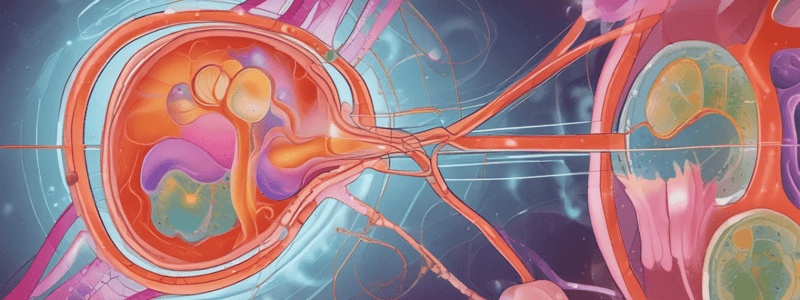Podcast
Questions and Answers
What is the primary purpose of the Cori cycle?
What is the primary purpose of the Cori cycle?
- To produce ATP molecules in the proximal tubule
- To shift the metabolic burden away from the exercising muscle during hypoxia (correct)
- To facilitate lactate uptake and oxidation in the presence of fatty acids
- To regenerate NAD+ from NADH in exercising muscle
What happens to lactate in the proximal tubule during the Cori cycle?
What happens to lactate in the proximal tubule during the Cori cycle?
- It is converted to glucose and reabsorbed back into the blood (correct)
- It is excreted into the urine
- It is oxidized to CO2 to fuel transport and basal metabolism
- It is stored in the proximal tubule for later use
What is the effect of fatty acids on lactate uptake and oxidation?
What is the effect of fatty acids on lactate uptake and oxidation?
- They stimulate lactate uptake and oxidation
- They enhance lactate production in the proximal tubule
- They have no effect on lactate uptake and oxidation
- They inhibit lactate uptake and oxidation (correct)
What is the primary source of lactate production in the kidney?
What is the primary source of lactate production in the kidney?
What is the expected effect of osmotic diuresis on medullary lactate concentration?
What is the expected effect of osmotic diuresis on medullary lactate concentration?
Flashcards are hidden until you start studying
Study Notes
Renal Gluconeogenesis
- The kidney can be considered as two separate organs: the proximal tubule produces glucose from non-carbohydrate precursors, while the medulla primarily utilizes glucose.
- Net arterio-venous glucose differences across the kidney can be misleading, as glucose consumption in the medulla can mask glucose release by the cortex.
- The kidney is a significant gluconeogenic organ in normal humans, accounting for up to 40% of whole-body gluconeogenesis in fasting individuals.
- Renal glucose release is increased in type 2 diabetes, similar to hepatic glucose release.
Lactate Handling in the Kidney
- Lactate can reach the nephron through filtration, blood flow, or production along the nephron.
- In the kidney, lactate can be oxidized to produce energy (consuming oxygen and generating ATP) or converted to glucose via gluconeogenesis (consuming oxygen and ATP).
- The kidney's ability to convert lactate to glucose participates in the Cori cycle (cell-cell lactate shuttle), which is important during vigorous exercise when oxidative phosphorylation is inhibited in muscle.
Cori Cycle (Cell-Cell Lactate Shuttle)
- In the Cori cycle, lactate produced in muscle is released into the blood and taken up by tissues capable of gluconeogenesis, such as the liver and kidney.
- In the proximal tubule, lactate is converted to glucose, which is then reabsorbed back into the blood for metabolism by the exercising muscle.
- The Cori cycle is an energy-requiring process that shifts the metabolic burden away from the exercising muscle during hypoxia.
Lactate Production in the Kidney
- Medullary lactate concentration is higher than in the cortex due to countercurrent arrangement of the vasa recta.
- Lactate production increases in the medulla during osmotic diuresis, possibly due to increased glycolysis driven by increased Na+ reabsorption.
- Distal nephron segments produce lactate through anaerobic glycolysis, especially during anoxia or when oxidative metabolism is inhibited.
- The IMCD (inner medullary collecting duct) has high levels of lactate production even under normal conditions, indicating it is primed for anaerobic glycolysis.
Studying That Suits You
Use AI to generate personalized quizzes and flashcards to suit your learning preferences.



